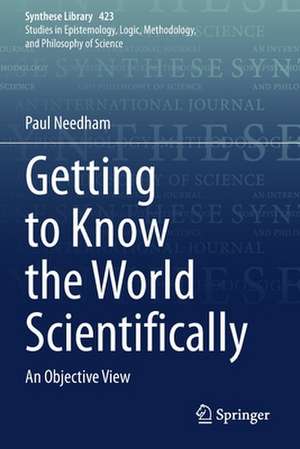Getting to Know the World Scientifically: An Objective View: Synthese Library, cartea 423
Autor Paul Needhamen Limba Engleză Paperback – 21 mar 2021
| Toate formatele și edițiile | Preț | Express |
|---|---|---|
| Paperback (1) | 374.30 lei 6-8 săpt. | |
| Springer International Publishing – 21 mar 2021 | 374.30 lei 6-8 săpt. | |
| Hardback (1) | 478.87 lei 6-8 săpt. | |
| Springer International Publishing – 21 mar 2020 | 478.87 lei 6-8 săpt. |
Din seria Synthese Library
-
 Preț: 543.27 lei
Preț: 543.27 lei - 15%
 Preț: 625.52 lei
Preț: 625.52 lei - 18%
 Preț: 969.92 lei
Preț: 969.92 lei - 15%
 Preț: 584.63 lei
Preț: 584.63 lei - 18%
 Preț: 885.61 lei
Preț: 885.61 lei - 15%
 Preț: 575.02 lei
Preț: 575.02 lei - 15%
 Preț: 682.42 lei
Preț: 682.42 lei - 18%
 Preț: 874.82 lei
Preț: 874.82 lei - 15%
 Preț: 630.33 lei
Preț: 630.33 lei -
 Preț: 282.33 lei
Preț: 282.33 lei -
 Preț: 434.20 lei
Preț: 434.20 lei - 5%
 Preț: 364.71 lei
Preț: 364.71 lei - 15%
 Preț: 624.71 lei
Preț: 624.71 lei - 18%
 Preț: 939.44 lei
Preț: 939.44 lei - 15%
 Preț: 629.38 lei
Preț: 629.38 lei - 18%
 Preț: 1205.69 lei
Preț: 1205.69 lei - 15%
 Preț: 629.83 lei
Preț: 629.83 lei - 18%
 Preț: 980.11 lei
Preț: 980.11 lei -
 Preț: 381.87 lei
Preț: 381.87 lei - 15%
 Preț: 624.39 lei
Preț: 624.39 lei - 18%
 Preț: 932.97 lei
Preț: 932.97 lei - 18%
 Preț: 1206.35 lei
Preț: 1206.35 lei - 15%
 Preț: 632.90 lei
Preț: 632.90 lei -
 Preț: 387.90 lei
Preț: 387.90 lei -
 Preț: 392.43 lei
Preț: 392.43 lei - 18%
 Preț: 1200.62 lei
Preț: 1200.62 lei - 15%
 Preț: 625.98 lei
Preț: 625.98 lei - 18%
 Preț: 1207.09 lei
Preț: 1207.09 lei -
 Preț: 372.80 lei
Preț: 372.80 lei -
 Preț: 386.95 lei
Preț: 386.95 lei - 15%
 Preț: 627.43 lei
Preț: 627.43 lei - 15%
 Preț: 626.15 lei
Preț: 626.15 lei -
 Preț: 374.30 lei
Preț: 374.30 lei - 15%
 Preț: 630.01 lei
Preț: 630.01 lei
Preț: 374.30 lei
Nou
Puncte Express: 561
Preț estimativ în valută:
71.63€ • 74.41$ • 59.50£
71.63€ • 74.41$ • 59.50£
Carte tipărită la comandă
Livrare economică 01-15 februarie 25
Preluare comenzi: 021 569.72.76
Specificații
ISBN-13: 9783030402181
ISBN-10: 3030402185
Pagini: 176
Ilustrații: X, 176 p. 1 illus.
Dimensiuni: 155 x 235 mm
Greutate: 0.27 kg
Ediția:1st ed. 2020
Editura: Springer International Publishing
Colecția Springer
Seria Synthese Library
Locul publicării:Cham, Switzerland
ISBN-10: 3030402185
Pagini: 176
Ilustrații: X, 176 p. 1 illus.
Dimensiuni: 155 x 235 mm
Greutate: 0.27 kg
Ediția:1st ed. 2020
Editura: Springer International Publishing
Colecția Springer
Seria Synthese Library
Locul publicării:Cham, Switzerland
Cuprins
Preface.- PART I: Knowledge, Objectivity and Values. Chapter 1. Knowledge.- Chapter 2. Objectivity.- Chapter 3. Relativism.- Chapter 4. The Use and Abuse of Science.- PART II: Philosophies of Science. Chapter 5. Popper: Proving the Worth of Hypotheses.- Chapter 6. Duhem’s Continuity Thesis.- Chapter 7. Realism and the Advancement of Knowledge.- Bibliography.- Index.
Notă biografică
Paul Needham is professor of theoretical philosophy at the University of Stockholm. He has a first degree in chemistry and a masters in philosophy, both from the University of Birmingham, and a doctorate in philosophy from the University of Uppsala. His interests include metaphysics, epistemology and the philosophy of science. He has previously worked on time and tense, causation and subjunctive conditionals. More recent interests are concerned with issues related to chemistry. This includes themes connected to the work of Pierre Duhem, particularly in connection with his role in the establishment of the field of physical chemistry, studies of the origins of the concept of chemical substance in the ancients and its development in more recent times, the discussion of natural kinds and criteria of sameness of substance in modern chemistry, and applications of mereology in the interpretation of macroscopic notions.
Textul de pe ultima copertă
This undergraduate textbook introduces some fundamental issues in philosophy of science for students of philosophy and science students. The book is divided into two parts. Part 1 deals with knowledge and values. Chap. 1 presents the classical conception of knowledge as initiated by the ancient Greeks and elaborated during the development of science, introducing the central concepts of truth, belief and justification. Aspects of the quest for objectivity are taken up in the following two chapters. Moral issues are broached in Chap. 4, which discusses some aspects of the use and abuse of science, taking up the responsibilities of scientists in properly conducting their business and decision-makers in their concerns with the import of science for society. Part 2 contrasts the view of scientific progress as the rejecting of old hypotheses and theories and replacing them with new ones, represented by Karl Popper, with the conception of progress as accumulating knowledge, saving as much aspossible from older theories, represented by Pierre Duhem. A concluding chapter defends the natural attitude of taking the theories of modern science to be literally true, i.e. realism, in the face of arguments drawn partly from the history of scientific progress in criticism of this stance.
Caracteristici
Explains how science is used and abused and what science is Connects systematic philosophical points with cases from history of science Introduces the discussion of the contemporary debate of scientific realism
